
Collateral Free Loans
- Multiple loan offers
- Get approved today
- Free application – no commitment
Compare top lenders
Together with our partners, we provide access to up to 19 reputable banks and lenders. Explore offers tailored to your needs and choose the most suitable offer. Each lender abides by the regulations outlined by the South African National Credit Regulator (NCR).
Apply for a loan in minutes and get matched with real offers right away—find the best option for you!
What Is Collateral?
Collateral refers to physical assets or valuable paper that a borrower pledges to a lender as security when applying for a loan. In loan agreements, it may also be called ‘security’. Common examples include property, vehicles, business equipment, or other valuable items; or investment paper such as fixed deposit certificates or share certificates. If the borrower fails to repay the loan, the lender has the legal right to claim and sell the collateral to recover the outstanding debt.
What Is a No-Collateral Loan?
A no-collateral loan, also called an unsecured loan, allows borrowers to access funds without pledging assets as security. This type of loan shifts the risk to the lender, as there is no direct way to recover the funds if the borrower fails to repay.
Getting an unsecured loan can be challenging, especially for small amounts. Even when a lender does not require collateral, they often request a personal guarantee. This means the borrower accepts full responsibility for repayment, even if the loan is taken for a business. If the borrower defaults, the lender has the right to claim personal assets, such as savings, property, or other valuables, to recover the outstanding debt.
No hidden fees, free application – no commitment
Types of Collateral-Free Loans
Collateral-free loans come in various forms, including personal loans, student loans, and credit cards. These loans do not require borrowers to pledge assets as security and can be structured as either revolving credit or term loans, depending on the borrowing arrangement.

Revolving Credit Loans
Revolving credit loans allow borrowers to access funds repeatedly up to a set credit limit. Once a borrower repays a portion of the balance, those funds become available for use again. This type of loan provides flexibility, as borrowers can withdraw, repay, and reuse credit as needed. Credit cards and personal lines of credit are common examples of revolving collateral-free loans. Since there is no fixed repayment schedule, borrowers must make minimum payments, and interest is charged on the outstanding balance.
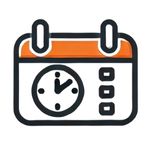
Term Loans
Term loans operate differently, as they have a fixed repayment structure. Borrowers receive a lump sum upfront and repay it in equal monthly instalments over a set period. These loans typically have a defined repayment term, and once the loan is fully paid off, the borrower cannot access additional funds without applying for a new loan. While term loans are often associated with secured financing, there are also unsecured term loans available. Examples include debt consolidation loans used to settle credit card balances and personal loans issued by banks or lenders without requiring collateral.
Growth of the Unsecured Loan Market
The demand for collateral-free loans has grown significantly in recent years, driven by advancements in financial technology (fintech). The expansion of online lending platforms has made access to unsecured loans easier and faster for many borrowers. Peer-to-peer (P2P) lending has also gained popularity, allowing individuals to secure loans from investors through digital platforms rather than traditional banks. This shift has provided more borrowing options, particularly for those who may not meet the strict lending requirements of conventional financial institutions.
Compare Loans in 3 Easy Steps

Fill in our application
Complete our loan application in minutes. Just enter your details and choose your desired loan amount.
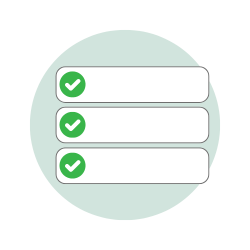
Choose a loan offer
Based on your responses, you will receive a variety of personalised offers from up to 19 lenders.
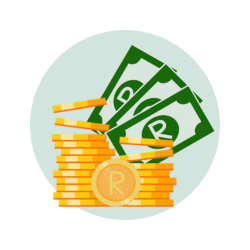
Get your money
You are free to accept or decline the offers as you please. The offers are non-binding.
Common Uses of Collateral-Free Loans
Collateral-free loans, also known as unsecured loans, provide individuals and businesses with access to funds without the need to pledge assets as security. These loans are versatile financial tools utilised for various purposes, including debt consolidation, medical emergencies, education expenses, business expansion, and personal expenditures.
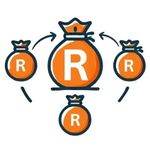
Debt Consolidation
Debt consolidation means merging several high-interest debts into one loan that may offer a lower interest rate. It allows borrowers to make repayment easier while potentially lowering the amount of interest paid over time. Unsecured personal loans are commonly used for this purpose, as they allow individuals to pay off credit card balances, payday loans, or other debts, streamlining their financial obligations into one manageable monthly payment.

Medical Emergencies
Unexpected healthcare expenses can place a significant financial strain on individuals and families. Collateral-free loans offer a quick solution to cover medical bills, surgical procedures, or other urgent health-related costs without the need for asset-backed security. The absence of collateral requirements enables faster approval processes, ensuring timely access to necessary medical treatments.

Education
Financing education-related expenses, such as tuition fees, textbooks, and accommodation, is another common use of unsecured loans. Students or their families can obtain these loans to invest in educational pursuits without risking personal assets. This approach facilitates access to higher education and skill development opportunities, contributing to personal and professional growth.

Business Expansion
Small business owners and entrepreneurs often require additional capital to expand operations, purchase inventory, or invest in marketing strategies. Collateral-free loans provide an avenue for securing necessary funds without pledging business or personal assets. This type of financing is particularly beneficial for businesses lacking substantial collateral but demonstrating strong cash flow and growth potential.
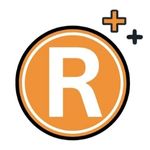
Personal Expenses
Unsecured loans are frequently utilised to finance significant personal expenditures, including:
- Home Improvements: Renovations or repairs to enhance living spaces or increase property value.
- Travel: Funding for vacations or travel-related costs.
- Weddings: Covering expenses associated with wedding ceremonies and receptions.
By opting for a collateral-free loan, individuals can manage these substantial expenses without liquidating savings or investments, maintaining financial stability while achieving personal goals.
19
Banks & Brokers
Comparing
85%
South Africans
Approved for Loans
1 500 000
Users Compared Loans Through Arcadia
What Are the Requirements for Loans Without Collateral?
Securing a collateral-free loan depends on several key factors that lenders assess before approving an application. These requirements vary between financial institutions but typically include the following:
- Credit Score: A strong credit rating increases the chances of approval. For personal loans, a score of at least 600 is often required, while business loans usually demand a credit score of 80 or higher. Major banks and credit unions may require a minimum of 650 for personal loans.
- Business Operating History: Many lenders prefer businesses that have been operating for at least two years. Some online lenders may consider applications from businesses with a minimum of six months in operation, but newer businesses and start-ups often struggle to qualify.
- Financial and Repayment History: Lenders review financial statements and repayment behaviour. A strong record of timely payments and responsible debt management can improve approval chances.
- Complete and Up-to-Date Documentation: Lenders require accurate financial records, proof of income, and other relevant documents to assess the applicant’s ability to repay the loan.
- Purpose of the Loan: The reason for borrowing plays a role in approval. Lenders prefer applicants who will use the funds for business expansion, operational growth, or other productive purposes rather than for covering financial losses.
Why Use Arcadia Finance?
- 100% free: The application is free and does not include any hidden fees.
- Quick & easy: The whole application process is done online in minutes.
- Convenient: Compare up to 19 banks & lenders with one application.
- Non-binding: You decide if you want to accept or decline your offers.
- Safe: Your personal data is safe with us.
What is Arcadia Finance?
Arcadia Finance helps South Africans in the search for loans from different banks and lenders through our loan broker partners. We provide access to up to 19 reputable banks and lenders. By completing our loan application you will get multiple loan offers, which you can compare and select the most suitable offer. The service we offer is completely free of charge and you will not commit to anything by requesting for loan offers via Arcadia Finance. We only work with trusted loan brokers who collaborate with NCR licensed banks and lenders in South Africa.

Advantages and Disadvantages of Secured vs Collateral-Free Loans
Benefits of Collateral-Free Loans
- No Risk to Personal Assets: If the loan is not repaid, the lender cannot seize property, vehicles, or other valuables since no security is required.
- Credit Score Growth: Making timely repayments can improve credit history and increase the credit score, making future borrowing easier.
- Less Financial Risk: Borrowers do not face additional financial losses beyond the outstanding debt, unlike secured loans where assets may be taken.
Disadvantages Collateral-Free Loans
- Legal and Collection Risks: If a borrower fails to make payments on time, the lender may take action by sending the outstanding debt to a collection agency or pursuing legal proceedings to recover the funds. This can result in additional fees, court costs, and long-term financial consequences.
- Long-Term Credit Record: Missed or late payments remain on the credit report for up to seven years, which may discourage other lenders from approving future loans.
Benefits of Secured Loans
- Higher Loan Amounts: Lenders are more willing to approve larger loan amounts because the collateral provides security, reducing their financial risk in case the borrower cannot repay.
- Easier Approval: Having collateral reduces lender risk, making secured loans more accessible, even for those with lower credit scores.
- Supports Major Purchases: Secured loans help finance big expenses such as buying a home, a car, or expanding a business by providing access to larger sums.
Disadvantages of Secured Loan
- Risk of Asset Loss: If repayments are not made on time, the lender has the right to seize the house, vehicle, or any pledged asset used as security.
- Debt May Exceed Asset Value: If the asset does not cover the full outstanding balance, the borrower must pay the remaining amount.
- Credit Score Impact: Failing to make payments can negatively affect credit history and lower the credit score, making future borrowing more difficult.
Secure your loan effortlessly with Arcadia Finance
The loan application is free, and you can pick from a variety of 19 respected lenders. We only work with trusted loan brokers who collaborate with NCR licensed banks and lenders in South Africa.
After submitting your loan application to us, we will send it through our loan broker partners to a number of different banks and lenders for review. Within minutes, you’ll receive a variety of loan options that are available for you. Select the one that best fits your needs.
Remember, all offers are no-binding, so if you don’t find what you’re looking for, you’re free to decline.
Conclusion
Collateral-free loans offer a convenient way for South Africans to access credit without pledging assets, making them suitable for various financial needs, including personal expenses, business funding, and emergencies. However, higher interest rates and strict repayment terms mean borrowers must carefully assess their financial situation before applying. Understanding eligibility requirements, loan terms, and repayment obligations is essential to avoiding financial strain. By comparing lenders, maintaining a good credit history, and ensuring affordability, borrowers can make informed decisions and use unsecured loans responsibly.
Frequently Asked Questions
Yes, but approval may be more challenging, and the interest rates will likely be higher. Some lenders specialise in offering unsecured loans to individuals with lower credit scores, but these often come with stricter repayment terms and additional fees.
The approval process depends on the lender. Many online lenders can process applications within 24 to 48 hours, while traditional banks and financial institutions may take several days or even weeks.
Missing a payment can have several consequences, including late fees, a lower credit score, and potential legal action from the lender. If the loan remains unpaid, the lender may refer the account to a debt collection agency, making future borrowing more difficult. Some lenders offer grace periods, but it is best to communicate with them immediately if you anticipate difficulty in making a payment.
In most cases, there are no restrictions on how the funds can be used. Borrowers commonly use unsecured loans for debt consolidation, medical bills, education, business expansion, and personal expenses. However, some lenders may prohibit using the loan for gambling, speculative investments, or illegal activities, so it is essential to review the loan terms before applying.
Some lenders allow early repayment without additional charges, while others may impose an early settlement fee.




